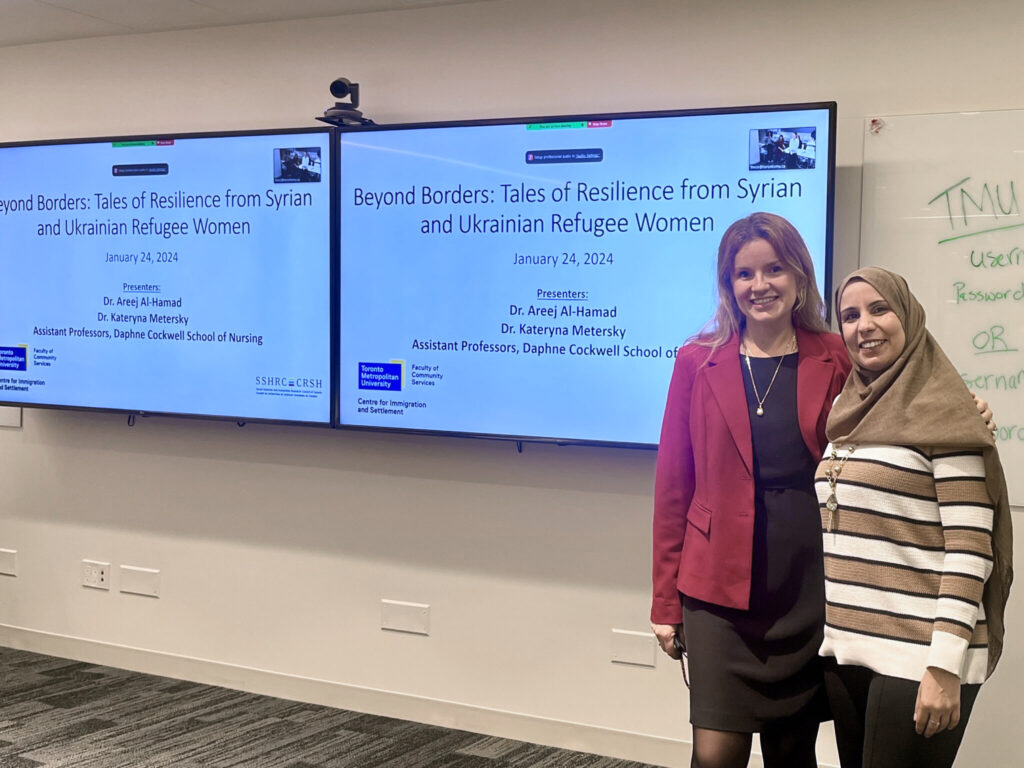
The potential for exploitation by the people who are hosting refugees came up as a key finding in a talk given by two professors this week on their most recent research: the first study of its kind drawing comparisons between Syrian and Ukrainian women who come to Ontario as refugees.
When researcher and professor Dr. Kateryna Metersky scrolled on her phone one night before going to bed, the last thing she expected to read was an article about Ukrainian refugee women being forced into sex work in London, ON. Metersky, who specializes in research on issues facing refugee women, described the situation she heard from Ukrainian women who were essentially told upon arriving in Canada, “Here’s a webcam, you’re going to do work for me. You’re staying in my house, you’re going to do work, connected to a male [and] other people who were viewing what they needed to do.”
This was one of the various issues facing refugee women that were presented in the “Beyond Borders” lunch and learn session hosted by the Toronto Metropolitan Centre for Immigration and Settlement (TMCIS) on Wednesday.
Metersky is a nursing professor at Toronto Metropolitan University (TMU), who migrated from Ukraine with her family at the age of 8 and since the war in Ukraine broke out, has focused her existing research on refugees on the plight of Syrian and Ukrainian women.
She and her research partner, Dr. Areej Al-Hamad, presented their most recent research at the Wednesday session, which was the first study to ever draw comparisons between the two different refugee groups when it comes to their sense of belonging in Canada and Ontario.
“It’s really interesting to know that two different refugee groups from two different backgrounds… both conceptualize their sense of belonging in Canada in their new home, and then how […] cultural background, displacement, economic conditions, shape their experiences or even sense of belonging here in Canada,” said Al-Hamad, who is a Syrian immigrant and has been working with Syrian refugee women for 10 years.
Through the use of ethnodrama, an engaging medium of disseminating information and knowledge, the two professors presented their extensive research findings which highlighted the issues of hosting homes, healthcare, and integration, facing these refugee communities.
Hosting Homes
Through their research grant from The Social Sciences and Humanities Research Council (SSHRC), Metersky partnered with Maggie’s, one of Canada’s oldest sex worker justice organizations, to help measure and report on the involvement of Ukrainian refugee women in sex work.
“They did not expect the number, the volume, of women who are forced into, expected to, or willingly go into this to make ends meet, either by their host that they come here under the host program, or others,” said Metersky, adding that this is the unfortunate reality for some when they come to Canada – it’s sometimes the only choice these refugee women have when they’re fleeing their war-torn country.
Al-Hamad said that this exploitation is only possible because Canada lacks proper government regulation on these host homes, meaning that anyone with an extra room or space in their basement can volunteer, she said.
“Many of these refugee women we interview … share in their narrative that they hope [for] some legislations, rules, and regulations that can control that particular hosting model,” said Al-Hamad.
Healthcare
Like many Canadians, refugee women have also dealt with known issues in our healthcare system, like the long wait times in the ER.
However, Metersky says they’re starting to think of other ways to combat and even by-pass these issues. Lacking adequate health care, some women rely on home remedies for some things, while more pressing concerns like dental care push some to take more extreme measures.
“Some of them are willing to pay to fly home into the war, into political unrest, [and] various other situations, just to get care there,” noted Metersky, as for many that are uninsured, it will end up being cheaper overseas.
True Integration
Another pressing issue the researchers described is the actual integration of these refugees within Canadian society. Ukrainian refugees are only given work permits while Syrian refugees received instant permanent residency upon arrival. Like many other immigrants to Canada, they are not able to transfer over their work experience or credentials.
“There is no sense of permanency for these people because they’re not given refugee status. We call them Ukrainian refugee women, but under Canada, they’re not recognized,” said Metersky, sharing that her own cousins quickly went back to Ukraine after coming to Canada as they could not practice their professions as doctors and lawyers like they were back home.
An attendee at the session, Jennilee Austria, who works to build communities with refugees through the Together Project, says social isolation is another challenge. “As you can imagine, a lot of them are coming as single moms and when you’re a single mom, you’re coming without a network,” said Austria.
Solutions
Austria explained that MakeWay’s Together Project initiative, which began in 2016 with the Syrian refugee crisis and now has over 1,300 volunteers, works to create welcome groups to help address the needs of refugees and newcomers to Canada and is one solution to bridge the gap.
Professor Zhixi Zhuang, the academic director of TMU’s Centre for Immigration and Settlement, said, “We need a refugee-centred healthcare system, we need to build a new family housing model, and also we need more funding … to generate new knowledge to tackle all these problems.”
Metersky echoed this, and said “in terms of resilience and inspiration, we hope that by sharing the voices of these women, we are helping them with their collective resilience.”
A fourth-year journalism student for On The Record, interested in local and international news.
